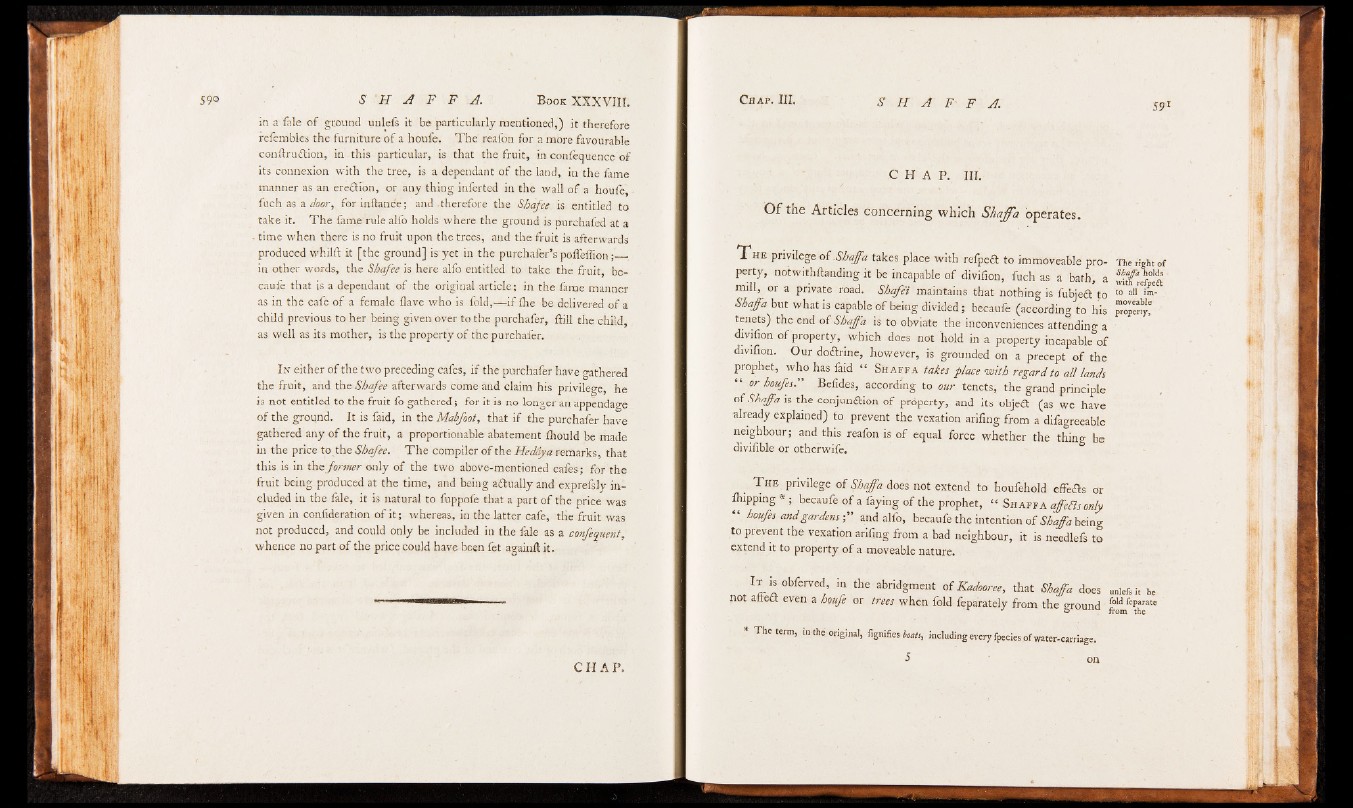
in a’ fale o f ground unlefs it be particularly mentioned,) it therefore
refembks the furniture of a houfe. The reafon for a more favourable
conftru&ion, in this particular, is that the fruit, in confequence of
its connexion with the tree, is a dependant of the land, in the fame
manner as an er eft ion, or any thing inferted in the wall of a houfe
fuch as a door, forinftanc'e; and .therefore the Shafee is entitled to
take it. The fame rule alfo holds where the ground is purchafed at a
- time when there is no fruit upon the trees, and the fruit is afterwards
produced whilft it [the ground] is yet in the purchafer’s poffeffion;_
in other words, the Shafee is here alfo entitled to take the fruit, be-
caufe that is a dependant of the original article; in the fame manner
as in the cafe of a female Have who is fold,— i f the be delivered of a
child previous to her being given over to the purchafer, ftill the child
as well as its mother, is the property of the purchafer.
In either of the two preceding cafes, if the purchafer have gathered
the fruit, and the Shafee afterwards come and claim his privilege, he
is not entitled to the fruit fo gathered; for it is no longer an appendage
of the ground. It is faid, in the Mabfoot, that if the purchafer have
gathered any of the fruit, a proportionable abatement Should be made
in the price to the Shafee. T h e compiler of the Heddyaremarks, that
this is in the farmer only of the two above-mentioned cafes; for the
fruit being produced at the time, and being actually and exprefsly included
in the fale, it is natural to fuppofe that a part of the price was
given in confideration of i t ; whereas, in the latter cafe, the fruit was
not produced, and could only be included in the fale as a confeauent,
whence no part of the price could have been fet againfl it.
I n
C H A P . I I I .
Of the Articles concerning which Shajfa operates.
1 HE privilege of .Shaffa takes place with refpeft to immoveable pro- The right of
perty, notwithftanding it be incapable of divifion, fuch as a bath a Sh.af a hf is
mm, or a private road. Shafei maintains that nothing is fubjeft to t0 a11 im-
Shajfa but what is capable of being divided; becaufe (according to his “ropmy!
tenets) the end of Shaffa is to obviate the inconveniences attending a
divifion of property, which does not hold in a property incapable of
divifion. Our doftrine, however, is grounded on a precept of the
prophet, who has faid “ Shaffa takes place with regard to all lands
“ or hw fef" Befides, according to our tenets, the grand principle
o f Shajfa is the conjunction of property, and its object (as we have
already explained) to prevent the vexation arifing from a difagreeable
neighbour; and this reafon is o f equal force whether the thin«- be
divifible or otherwife.
T he privilege of Shaffa does not extend to houfehold effects or
flnppmg * ; becaufe of a faying of the prophet, “ Shaffa affefts only
“ houfes and g a r d e n s and alfo, becaufe the intention of Shaffa beino-
to prevent the vexation arifing from a bad neighbour, it is needlefs to
extend it to property of a moveable nature.
! t isobferved in the abridgment of Kadooree, that Shaffa does unlefs it be
not arrect even a houfe or trees when fold feparately from the «round fold feParate
x J t> from the
* The term, in the original, fignifies loan, including every fpecies of water-carriage.
5 on